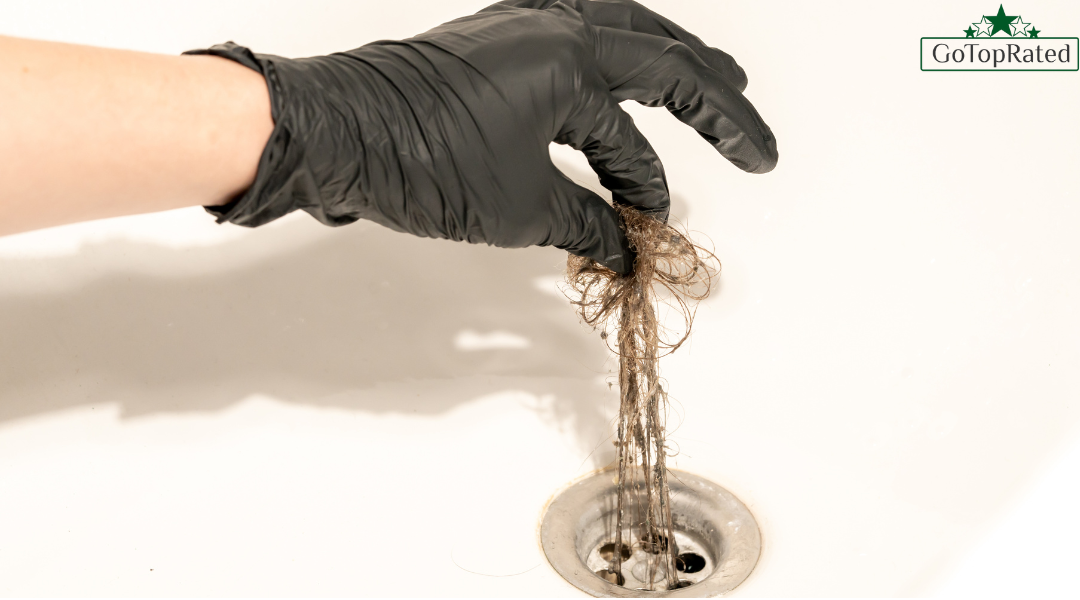Clogged drains are a common issue in homes, and they may result in major plumbing problems, including poor drainage and bad odors. Maintaining an effective plumbing system and drain cleaning and preventing expensive repairs require understanding their typical causes and implementing preventative measures.
Common Causes of Clogged Drains
1. Hair Buildup
Hair accumulation is one of the most common reasons for clogged drains, especially in restrooms. Hair can create clumps that eventually clog the drain as it sheds during showers and mixes with soap scum and other debris.
Prevention Tips:
- Use a drain cover: Installing a simple hair trap or drain cover can catch most of the hair before it enters the drain.
- Regular cleaning: Remove hair from the drain cover after each shower to prevent buildup.
- Routine maintenance: Every month, flush the drain with hot water to help dissolve any soap scum or small amounts of hair.
- Brush Before Showering: Brush your hair before showering to reduce the amount of loose hair going down the drain.
2. Soap Scum
Soap may seem harmless, but over time, the ingredients in soap, particularly those containing fats, can accumulate in pipes. This creates a hard residue known as soap scum, which restricts water flow and attracts other debris like hair and dirt.
Prevention Tips:
- Switch to liquid soap: Bar soaps frequently include fats that promote the accumulation of soap scum. Blockages are less common with liquid soaps.
- Hot water flushes: A weekly pour down the drain of hot water will help break up soap scum and other residue that may be stuck in the pipes.
- Water Softener: Consider installing a water softener to reduce the minerals in your water, which can help prevent soap scum buildup.
- Vinegar and baking soda: A monthly application of vinegar and baking soda can help break down soap scum naturally.
3. Grease and Oil
Cooking oil and grease are especially likely to block kitchen drains. When these materials are heated, they may appear liquid, but when they cool, they harden and clog pipes. Grease accumulation and food particle trapping over time might result in hard-to-remove blockages.
Prevention Tips:
- Never pour grease down the drain. Always let grease cool, then dispose of it in the trash or recycle it where possible.
- Wipe pans and dishes: Before washing, wipe greasy pots, pans, and dishes with a paper towel to remove excess oil.
- Hot water and dish soap: Occasionally run hot water mixed with dish soap down the drain to help break down residual grease.
- Degreaser Products: To clean your drains periodically, use a mild degreaser or a mixture of hot water, vinegar, and baking soda.
4. Food Waste
Food scraps washed down the drain are the main source of kitchen blockages. Even tiny food particles, particularly starchy or fibrous foods like potato peels and celery, can block pipes or garbage disposals.
Prevention Tips:
- Use a strainer: Place a sink strainer over the drain to catch food particles.
- Compost when possible: Compost organic waste whenever possible instead of flushing food down the sink.
- Chop It Up: Cut larger food scraps into smaller pieces before using the disposal to prevent clogs.
- Run water while using the garbage disposal: If you own a garbage disposal, ensure it is flushed thoroughly with food waste by running cold water through it, and it will operate for a little while afterward.
5. Tree Roots
Tree roots are a more significant problem that clogs sewage systems and outdoor drains. Roots are naturally attracted to moisture and can enter even the smallest breaches in underground pipes, causing blockages that must be repaired by a specialist.
Prevention Tips:
- Regular inspections: If trees are close to your home, you might want a plumber to use a camera to check your pipes for root invasion early on.
- Chemical root killers: Commercial products designed to kill tree roots before they cause significant damage can be used preventatively once a year.
- Professional Help: If you believe tree roots are causing a blockage, call a professional plumber to assess the problem and, if required, then repair it.
- Tree placement: Avoid planting trees too close to your main sewer line or drains.
6. Foreign Objects
Small items like jewelry, toothbrushes, children's toys, and others can easily fall into sinks or toilets and seriously clog them. These foreign objects might obstruct water flow or become trapped in bends in the pipes.
Prevention Tips:
- Install drain covers: A drain cover can prevent larger objects from accidentally falling into the drain.
- Educate your household: Children should be taught what belongs in the toilet and what doesn't, and you should watch out for anything that might end up down the drain.
- Regular Inspections: Check your drains for signs of potential blockages and remove them promptly.
- Be cautious with small items: To reduce the risk of falling, keep tiny things in safe locations away from drains and sinks.
7. Toilet Paper Buildup
Toilet paper is intended to decompose in water, but flushing too much at once or using a too-thick type might block pipes. This is particularly typical with older plumbing installations.
Prevention Tips:
- Use less toilet paper: Avoid using only necessary and excessive amounts in one flush.
- Consider thinner toilet paper: Some brands are more prone to causing blockages, so if your plumbing is sensitive, opt for thinner, biodegradable options.
- Flush in stages: If you must use more toilet paper, flush the toilet more than once to avoid creating a clog.
8. Mineral Buildup
Minerals like calcium and magnesium can accumulate within pipes over time in locations with hard water. This scale obstructs the passage of water, which can cause full obstructions or delayed drainage.
Prevention Tips:
- Water softeners: Installing a water softener can help prevent mineral buildup in your pipes.
- Descaling treatments: Descaling solutions can be poured into drains to dissolve minerals and prevent further clogs.
- Regular pipe maintenance: If you live in an area with hard water, inspect your pipes periodically for signs of scaling.
9. Flushing Non-Flushable Items
Wipes, feminine hygiene products, diapers, cotton swabs, and paper towels are among many items that shouldn't be flushed down the toilet. These items can cause serious obstructions in your plumbing system since they don't decompose like toilet paper.
Prevention Tips:
- Only flush toilet paper: Make sure everyone in your household knows the toilet is only for toilet paper.
- Keep a trash can nearby: Place a waste bin in the bathroom to encourage proper disposal of non-flushable items.
- Dispose of wipes properly: Even “flushable” wipes can cause problems, so throwing them in the trash is better than flushing them.
10. Pipe Damage
Older pipes, especially those made of clay or cast iron, are susceptible to deterioration. Damage to the pipe may cause leaks, splits, or collapses. These events can cause major blockages when material becomes lodged in the damaged parts of the pipe, interrupting water flow.
Prevention Tips:
- Replace aging pipes: If your house's plumbing is outdated, consider replacing it with more resilient materials like PVC.
- Professional inspections: Regular plumbing inspections can catch issues early and prevent major clogs or pipe failures.
- Avoid using chemicals: Harsh chemical drain cleaners can weaken pipes over time. Opt for natural solutions or call a professional for tough clogs.
Conclusion
Preventing clogged drains requires awareness of the common causes and taking proactive steps to keep your plumbing system healthy. Whether it’s hair in the shower, food in the kitchen sink, or flushing the wrong items down the toilet, being mindful of what goes down the drain is key. Regular maintenance, such as cleaning drain covers, using hot water flushes, and scheduling professional inspections, can go a long way in preventing blockages and keeping your plumbing running smoothly.






Comments